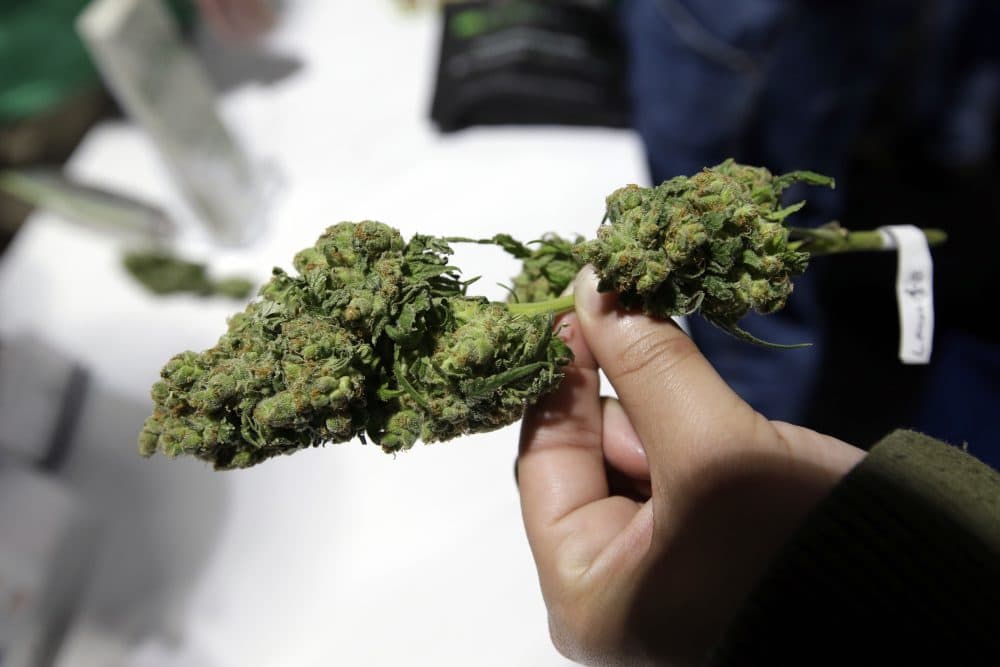Advertisement
1 In 5 Mass. Adults Have Recently Used Marijuana Recreationally, Study Finds

Twenty-one percent of adults in Massachusetts have used recreational marijuana in the last 30 days, says a new study from the state on recreational pot use.
That's among the highest, if not the highest, rate in the nation. Vermont had close to 18 percent in the latest federal analysis, from 2016.
The Massachusetts report was requested by state legislators in advance of legal cannabis sales. It looked at overall use, how adults consume marijuana, how often they drive while under the influence, hospitalizations and the economic impact.
Young adults are driving the high use rates in Massachusetts. Half of all 18 to 25 year olds who responded to the survey say they smoked or vaped the drug, or ate a marijuana-laced edible, in the past month.
"Those numbers are off the charts," said Steven Davenport, an assistant policy researcher who focuses on marijuana at the RAND Corporation in Boston, "just massively higher than those you see recorded in data sets like the National Study on Drug Use and Health."
The most recent data from that national survey puts marijuana use for 18 to 25 year olds at 28 percent. Some cannabis industry analysts adults, young and old, may be responding more honestly in Massachusetts now that possession of up to one ounce in public is legal for those 21 or older.
Some physicians say the young adult use numbers are a call for more education. Dr. Kevin Hill says marijuana may be less risky than alcohol or opioids, but use is not necessarily safe.
"If you use cannabis, it's going to affect your ability to drive," said Hill, the director of addiction psychiatry at Beth Israel Deaconess Medical Center. "And young people should be aware that if they're using cannabis in a chronic way that if may affect their ability to think critically and may affect your brain's function moving forward."
More than half of 3,022 recreational marijuana users surveyed said they see few if any risks to using marijuana for recreational purposes. Most smoke their cannabis, but 40 percent used it in other ways. There are differences by race, gender and geography:
- 26 percent of residents who used marijuana in the last 30 days are men; 17 percent are women
- Overall use is highest in western Massachusetts: 30 percent
- 71 percent of adult users are white; 12 percent are Hispanic; 7 percent are blacks; and 3 percent are Asian
Thirty-four percent of recreational marijuana users reported driving under the influence of marijuana. But it's not clear whether adults felt impaired by that influence.
"Nowhere in this study do they say that drivers are impaired on the road or that impairment has caused any increase in accidents," said Jim Borghesani, a cannabis industry consultant who was the spokesman for the 2016 legalization campaign.
Study author Marc Nascarella says marijuana affects drivers differently. He advises police to assess a combination of factors when possible.
"It's measuring exposure to the substance, it's measuring the timing of that exposure and their ability to operate a vehicle," Nascarella said. "It's a fairly complicated task that law enforcement is challenged with right now."
State legislators who asked for this report also requested information about how much money the state can expect to raise from recreational sales. The answer: $215.8 million during the first two years. Local tax revenue will range from $233,498 to $2.8 million and assumes that 65 percent of marijuana users will switch from illegal to legal purchases.
Borghesani predicts more people will shift to legal sales.
"If you can buy something safely and legally, why would you buy it in an unsafe or illegal environment?" he said.
The experience of some, but not all states, suggests use will increase in Massachusetts with legalization.
Davenport says it will be important to track not just whether more adults buy cannabis, but how often they are using and the intensity of their use.
"If you think about what generates harms in cannabis use, you see the most harms borne by heavy [daily] users, not regular users," he said. And Davenport says sales are shifting to extracts with higher concentrations of THC "that carry public health concerns."
Hill says he's glad to see the Massachusetts Cannabis Control Commission develop a research office that will follow-up on this baseline data. He urges including the effects of cannabis on psychiatric disorders like depression, anxiety, ADHD or schizophrenia in future studies.
"It's very exciting and people want to talk about who's going to get licenses and things like that, but you don't want public health to take a back seat," Hill said.
For medical marijuana users, the report surveyed 6,934 Massachusetts adults. The major takeaways:
- The majority used cannabis 21 days out of the last month, and spent $240 for the month
- 65 percent of the patients smoked; 62 percent vaped; and 51 percent used edibles
- 10 percent reported driving under the influence
For more updates on the industry, join our Facebook group, Green Rush: Cannabis in Massachusetts.
This article was originally published on June 29, 2018.
